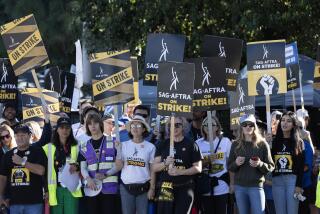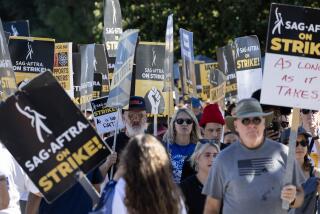Talks Make Little Progress Amid Sniping : Baseball: Owners and players again criticize each other’s stance, but they will keep negotiating.
SCOTTSDALE, Ariz. — They exchanged tax proposals and trash talk Saturday. Baseball’s labor negotiations appeared in limbo again, but appearances have been deceiving throughout the 205-day players’ strike. No matter what each thought of the other’s proposition--and neither thought too highly--both have numbers on the table for the first time and probably will resume bargaining this morning.
For how long?
“At the rate we’re moving this, we could be here until Labor Day,” said Colorado Rocky owner Jerry McMorris, management’s chief negotiator. “We could all have Arizona residence before it’s over.”
Then again, there’s no guarantee the punishing process can survive another day like Saturday, when emotions soared, relationships soured and each side found time to conduct two news conferences, castigating the other’s offer and responding to what the other had said.
Can they cut through the emotions to conduct some serious bargaining in time to put the regular players back to work for the start of the season?
Both consider the next 48 hours critical in that regard, but the union, sources said, has grown distrustful of McMorris and skeptical of his authority amid inconsistent shifts in the owners’ negotiating stance.
Union leader Donald Fehr said the owners’ proposal Saturday left the players with “profound sadness” because it was a significant regression from their previous proposals and the proposals made by special mediator William J. Usery on Feb. 7, which McMorris, according to the union, had said this week would form the accepted baseline for new proposals.
On Saturday, the owners basically returned to the Usery tax rates--50% on all payroll above the average of $40.7 million--but reversed the Usery proposal in six areas.
Among them: Instead of unrestricted free agency for four- and five-year players, they now would be subject to right-of-first-refusal free agency; instead of a three-year phase-in for the tax plan, the tax would become effective immediately; instead of a six-year agreement with the right to reopen on the tax plan after four years, the agreement would be for seven years with the right to reopen strictly on the tax rate after five. It also would leave two- and three-year players without arbitration or free agency, and while arbitration would remain in place for 1995, no player could be awarded more than a 100% raise.
“It clearly does not represent an attempt to reach out,” said Fehr.
McMorris responded by agreeing that he had told the union he would not regress from the Usery proposal, but only in regard to the tax. “The union can’t use Usery like a cafeteria line, picking and choosing what it wants,” he said.
He also said the union’s tax proposal--25% on all payroll over $54 million or 133% of the average--was slim and disappointing in that only the Detroit Tigers, based on 1994 calculations, would have been taxed at about $640,000, meaning it fails to produce the desired deterrent to salary growth.
More to Read
Go beyond the scoreboard
Get the latest on L.A.'s teams in the daily Sports Report newsletter.
You may occasionally receive promotional content from the Los Angeles Times.










